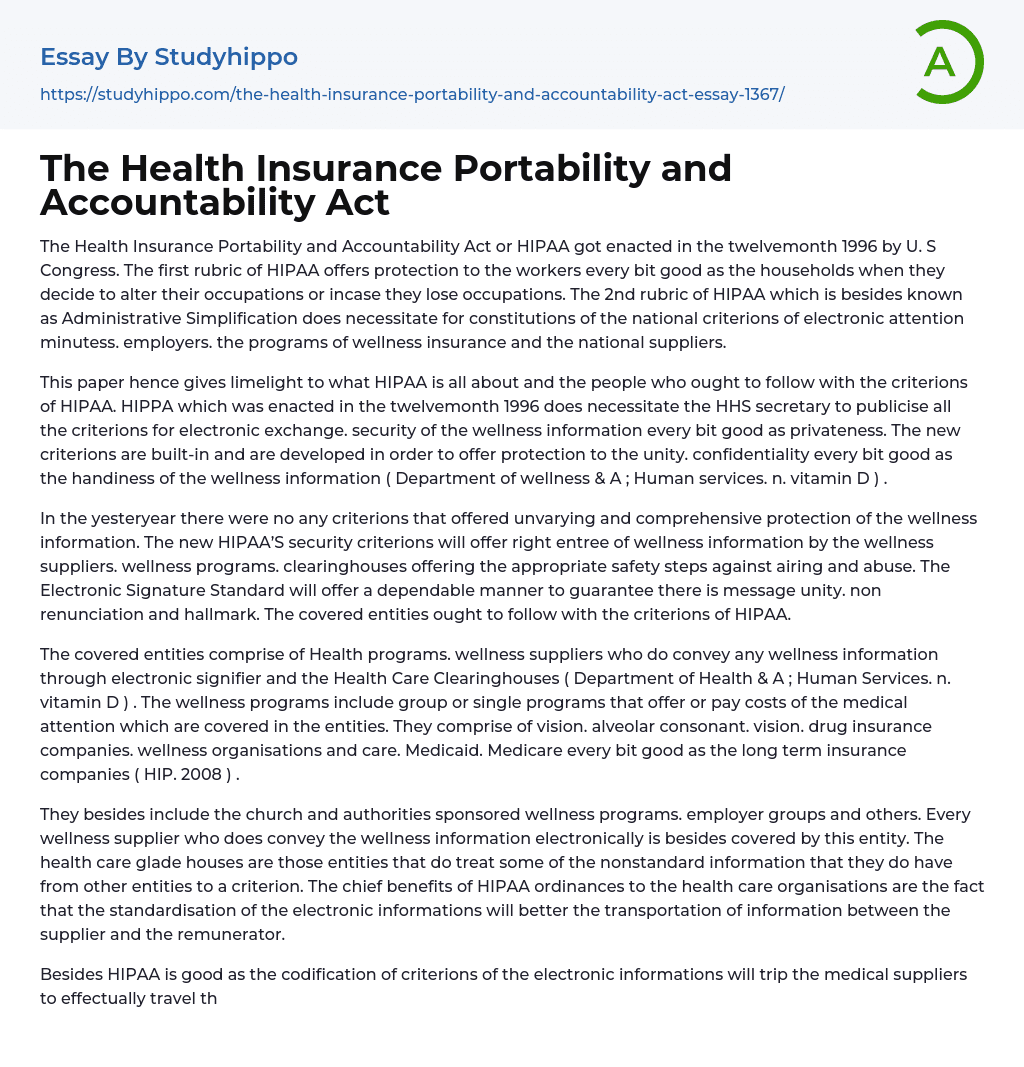

The Health Insurance Portability and Accountability Act Essay Example
The U.S. Congress enacted the Health Insurance Portability and Accountability Act (HIPAA) in 1996. HIPAA's first title provides safeguard for workers and their families in case of job loss or changes. The second title, also known as Administrative Simplification, mandates the adoption of national standards for electronic healthcare transactions by employers, health insurance plans, and healthcare providers. This article sheds light on HIPAA, who must comply with its provisions, and what it encompasses. HIPAA requires the Health and Human Services (HHS) Secretary to publish security standards for electronic exchange, privacy, and protection of health information. The new rules offer comprehensive and uniform protection to ensure the availability, confidentiality, and integrity of healthcare information. These new HIPAA security standards grant appropriate access to healthcare information to providers, programs, and clearinghouses while ensuring the appropriate steps against unauthorized disclosure and misuse.The Electroni
...c Signature Standard provides a reliable method for ensuring message consistency, non-repudiation, and authentication. Covered entities must comply with HIPAA standards. These entities include health programs, wellness providers who transmit health information via electronic means, and Health Care Clearinghouses (Department of Health ; Human Services.n.vitamin D). Health programs consist of group or individual programs that provide or pay for medical expenses covered by the entities such as dental, vision, insurance, wellness organizations, and care. Medicaid, Medicare, and long-term insurance companies are also included, as well as church- and government-sponsored health programs, employer groups, and others. All health providers who transmit health information electronically are covered by this entity. Health care clearinghouses process some nonstandard information received from other entities to a standard. HIPAA regulations benefit health care organizations by standardizing electronic data, improving the transmission of
information between providers and payers.The Bureau for Medical Services (2008) states that HIPAA is beneficial for setting electronic information standards, enabling medical providers to effectively deliver their services online. Additionally, HIPAA presents healthcare organizations with an opportunity to simplify and streamline their infrastructure and operations, resulting in possible cost savings. The implementation of HIPAA standards could reduce administrative requirements. It should be noted that HIPAA standards do not apply to employers, casualty, life, disability and workers' insurance companies, and other health information users. The primary aim of HIPAA's privacy rule is to safeguard individuals' health information while ensuring the necessary flow of information to provide and promote quality healthcare, ultimately protecting the well-being of the public. This rule also provides protection for those seeking healing and care in an increasingly diverse healthcare market. The privacy rule is deliberately designed in a comprehensive and flexible way to address required disclosures and uses.
- Cloning essays
- Medical Ethics essays
- Patient essays
- Therapy essays
- drugs essays
- Cannabis essays
- Aspirin essays
- Cardiology essays
- Hemoglobin essays
- Pharmacology essays
- Surgery essays
- alternative medicine essays
- Plastic Surgery essays
- Organ Donation essays
- Vaccines essays
- Medical essays
- Dentist essays
- Psychological Trauma essays
- Physical therapy essays
- Cold essays
- Cocaine essays
- Why Marijuana Should Be Legalized essays
- Drug Abuse essays
- Teenage Drug Abuse essays
- Heart Disease essays
- Artery essays
- Accountability essays
- Accounting Software essays
- Accounts Receivable essays
- Auditor's Report essays
- Balance Sheet essays
- Cash essays
- Cash Flow essays
- Costs essays
- Financial Audit essays
- Internal Control essays
- International Financial Reporting Standards essays
- Management Accounting essays
- Principal essays
- Tax essays
- Addiction essays
- Anatomy and Physiology essays
- Biodegradation essays
- Cancer essays
- Dental Care essays
- Disability essays
- Disease essays
- Disorders essays
- Health Care essays
- Infectious Disease essays



